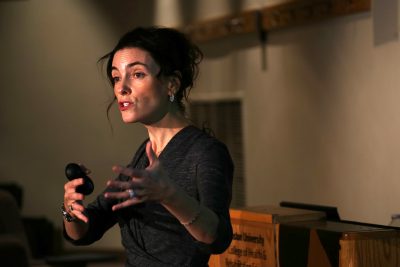
Although the topics of sex and gender flood television headlines and high school pamphlets, the wide-reaching discussion surrounding the application of medicine based on sex and gender has a much quieter voice.
Alyson McGregor holds many responsibilities as both a professor of emergency medicine and director of the Division of Sex and Gender in Emergency Medicine at Brown University. There, along with her colleagues, she published the book “Sex and Gender in Acute Care Medicine.”
She returned to Boston University on Wednesday to speak as the 9th Annual Meredith E. Drench lecturer at BU’s Sargent College of Health and Rehabilitation Sciences. She spoke about the risks women face due to lack of pharmaceutical testing on females and the fundamental anatomical and physiological differences between men and women.
The Meredith E. Drench Lecture memorializes the late behavioral specialist who “bridged the fields of physical rehabilitation and psychological behavioral sciences,” according to Dean of Sargent College Chris Moore.
In addition to the nearly 1.5 million people who viewed her TEDx talk online, a lecture hall full of eager attendees had the chance to hear her speak.
“The audience today seems as though they will be very variable; from student to non-MDs to researchers,” McGregor said before the talk. “I created [the talk] as a window into how sex and gender matters in medicine and health … I want to show people how important it is to think about sex and gender in medicine.”
McGregor first discovered her interest in drug testing on women over 10 years ago, she said. She questioned the commonly held theory, or equation, that “women’s health equals reproductive health.”
When choosing to go into the field of women’s medicine, she questioned, “Why, if I go into women’s health, do I have to be in reproductive health?” She said she realized that women’s health is more than just that.
In her talk, McGregor focused on the fundamental, and sometimes fatal, difference between female and male metabolisms in relation to the drug Ambien. Ambien is used to aid insomnia and was exclusively tested on men, she said. It was later found that the drug remains in the female bloodstream longer than the male due to differences in metabolisms. This led to several fatal car accidents due to drowsiness in the morning after taking the drug. Several other drugs have been found to have fatal consequences on women that otherwise are perfectly safe for men.
Not only did McGregor say she believes testing needs to be expanded to women, but also transgender men and women.
“When you have a transgender person, you have to think about their biological sex and their gender identity,” McGregor said. “Those two may not always be congruent. Understanding what risks their sex might give them and what risks their gender might give them is important in individualizing care for that person.”
McGregor said she believes the fundamental setback in expanding to test all drugs on women is based mostly on what people are accustomed to.
“It’s a cognitive transformation,” McGregor said. “Having to change the way that you design your research, analyze your research and practice medicine is challenging. People don’t like to be told they’re doing things incorrectly.”
Moore noticed McGregor’s focus on medical “assumptions” when choosing her as the speaker, saying, “A great thing about Dr. McGregor’s interests is that she’s very sensitive to the idea of patient-centeredness and outcome-based medicine. Her work drags us into our own biases and unquestioned assumptions. It makes us consider what were we assuming when we tested only one sex or gender.”
This can only be changed by institutionalizing medical testing on women, and recognizing the differences between the male and female anatomies. McGregor makes a suggestion to begin this learning process.
“Consider research, clinical care and education,” McGregor said. “All of these things have to happen simultaneously. We have to start educating in school the differences, start practicing what we know right now, and start finding more research.”
The science behind medical testing on women is a developing theory that needs to be nurtured and understood, although it is not perfect.
“We thought the Earth was flat at one point … The longer you’re involved in medicine and science, the more humbling it is,” McGregor said. “The more you realize it evolves and you have to evolve with it.”
This perspective causes many other peers and researchers to admire her and her work.
“We’re proud to have someone of her stature come from BU,” Moore said. “[Her work] is inspiring for our own students, many of whom hope to follow a similar path to hers.”


























































































































